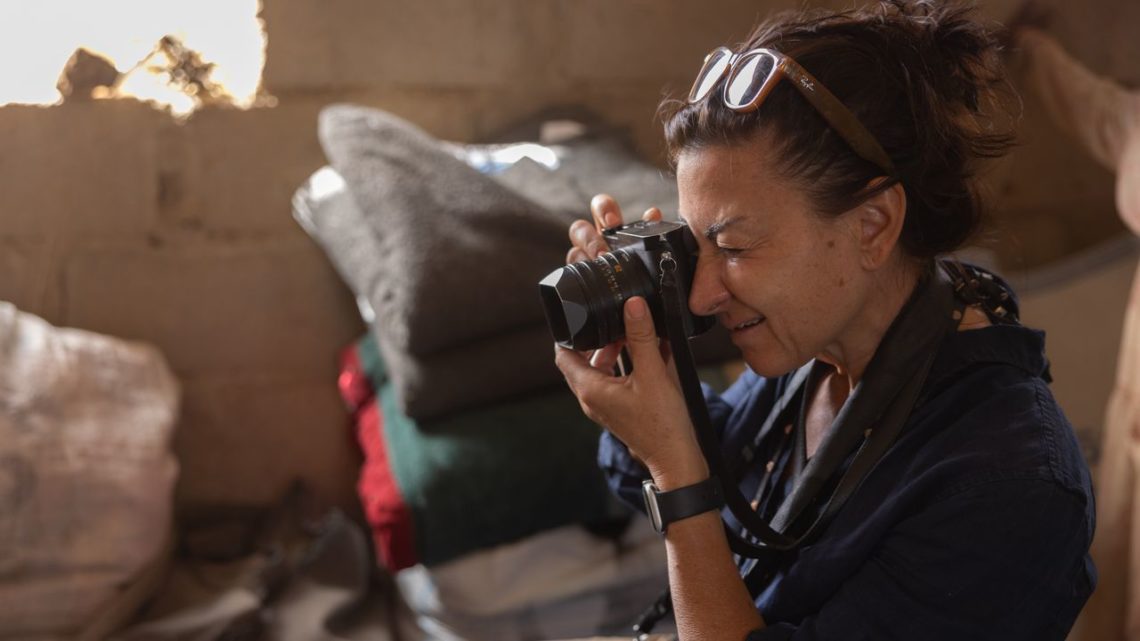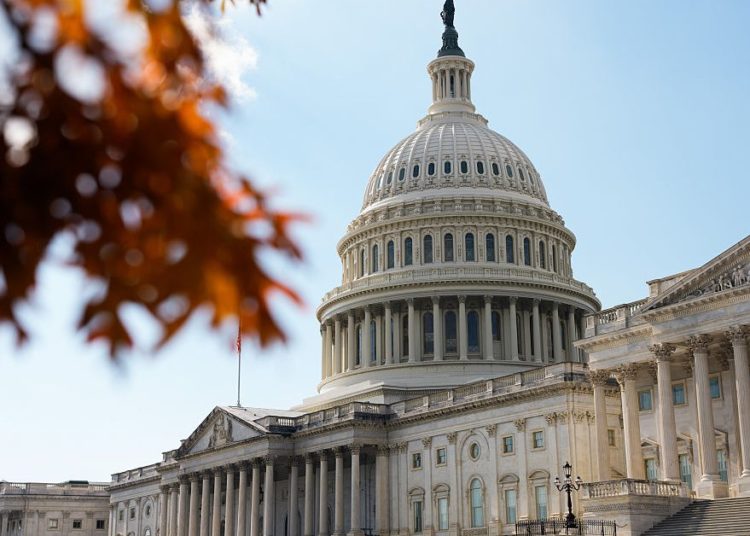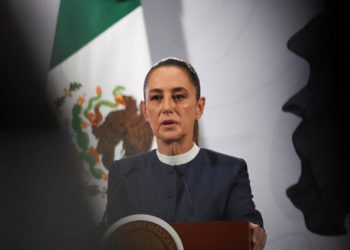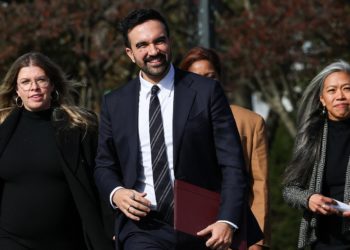Many had tried to make a documentary about New York Times photographer Lynsey Addario—but Addario had turned all of them down. “It felt a bit narcissistic. Why would I be the person that they follow?” the Pulitzer Prize–winning photojournalist tells Vanity Fair. After seeing several films about war correspondents, though, she started to change her mind. “They were always men, and no one ever really got it right.”
So when Chai Vasarhelyi and Jimmy Chin, the Oscar winners behind Free Solo, approached Addario about a film, she said yes. “I’m a big fan of their work, and I love the fact that they came at it from having done these great documentaries, always focusing on people with a passion,” she says. It helped, too, to have a female filmmaker chronicling her story.
Vasarhelyi and Chin started working with Addario just as Russia’s invasion of Ukraine was beginning in 2022. Their gripping film Love + War—which premieres on National Geographic on November 6 and streams on Disney+ and Hulu on November 7—follows her over about two years while also looking back at how she became one of the most important conflict photographers working today. The doc captures Addario’s work in Ukraine, the Middle East, Africa, and Afghanistan, along with the challenges she faces as a mother who often has to be away from her family.
Addario and Vasarhelyi spoke with Vanity Fair about capturing Addario’s work, her vulnerability before the cameras, and the most surprising reaction they’ve gotten to Love + War.
Vanity Fair: How difficult was it logistically to film Lynsey wherever she was?
Chai Vasarhelyi: She’s working in very sensitive places, and so we got quite lucky. Lynsey works with a colleague, Andriy Dubchak, who is a very well-respected Ukrainian journalist who also films, and they were going to be working side by side no matter what. That’s why it feels so intimate and raw, because it is their process—how they would normally work. You always have to find the right alchemy, and it really is a testament to Lynsey’s commitment where she wasn’t doing this in a half-assed way. She understood what would make it great.
Lynsey, were you nervous about opening up about your family life?
Lynsey Addario: Every parent has that tough balance, and every parent feels guilty. For me, it wasn’t really a question as to whether I would open up my family life once I committed to the project, and once my husband and my kids signed off. I do this for a living, so I knew what the requirements were. I knew what they would be asking of me, and I knew the elements that would make it poignant: vulnerability, and being honest and transparent about how tough things are. I think that when people so carefully curate documentaries on their lives, it doesn’t help any of us, because then we all feel like shit. It was important for me to just say, “okay, I’ll be criticized as a mother.” I already am. When I wrote my memoir, I was already criticized for going to war, for working while pregnant, for all of these things. I hope that it helps people and gives a different perspective.
Chai, did this film feel more personal to you? You’re also a mom who has to go away, and Jimmy also goes to dangerous places for work.
Vasarhelyi: I would say that this is a very personal film for me, and I was kind of disarmed by how difficult it was for me to work with the material of Lynsey with her children. Our circumstances are a little different; Jimmy’s line of work is quite dangerous. But I think that’s what people are really responding to: how disarmingly honest the film is, and about those things that we’re never allowed to say out loud, that work might be easier than parenting. And also that feeling of never being in the right place at the right time, of always feeling torn. I live my whole life like that.
How did you know where to end the story? Because Lynsey, your story is ongoing.
Vasarhelyi: It was two things. Lynsey spent so much time in Afghanistan, and committed to telling that story and all of its different dimensions. So when she returned post the return of the Taliban, that really moved me. I kept on being like, “Isn’t this somehow defeating?” To see the rights of women degraded again? Just the compassion and the openheartedness she brought to that return trip, it felt like that was the point: the story continues. The work is what matters, and the job is never really done.
Lynsey, what’s it like for you to watch the movie?
Addario: It’s rough. It’s a pretty traumatic experience. The first few times, I couldn’t get through it without completely breaking down. Once they bring my family in, then it becomes really emotional. I go through this life on a real mission to tell these stories and to document the horrors, but I can’t get so caught up in the impact that has on my loved ones or else I would never do it. And so to watch the film is to watch the negative fallout on all the people I love.
What did your family think when they saw it?
Addario: I remember my dad just was like, “Oh sweetie, you really opened.” What’s surprising to me is how surprised people are by how open I am in the film. I guess most people don’t know me personally, like my private life, but I don’t really have a filter. I’m wide open. I say all the wrong things, but I think that that’s kind of who I am.
What current conflicts do you wish were receiving more attention now?
Addario: Definitely the conflict in Sudan. I worked there 20 years ago, covering the war in Darfur between 2004 and 2009. It was such a different time because the whole international community and especially the United States were all invested in talking about Darfur, about the genocide and the fact that there were war crimes being committed. George Clooney was always talking about it. Now I think it’s such a different time, where it seems like we’re being inundated by these images of war—whether it be from Ukraine or Gaza or Syria or now Sudan. I think Sudan deserves more attention, especially now [that] we’re becoming aware of these mass atrocities that took place or that are taking place. We’re seeing executions, we’re hearing testimonies from eyewitnesses of women being raped.
Are you worried at all about the state of conflict journalism?
Addario: Yes, of course I am. Right now there are so few publications that are willing to send photojournalists to war. The risks are obvious. Since I first started 25 years ago, there’s [been] a rise in kidnapping, there’s a rise in targeted killings of journalists that often take place with impunity. Very few people are ever held accountable for killing journalists. We’re seeing that in Gaza, where over 200 journalists have been killed. Routinely, journalists are killed because there are people around the world who don’t want the truth to come out about what happens. So it’s easier to just kill the messenger. Because of that, publications are more and more ambivalent to send their journalists out, and that’s a very difficult place to be. The outlets that I can work for are less and less. It’s very difficult knowing that the venues are smaller, the publications are out of money, and that they’re just not willing to take the risk to send people to cover war.
What do you feel people misunderstand about life in a conflict zone?
Addario: People assume a conflict zone is limited to the frontline, or that life doesn’t go on. But actually, life is still going on in much of the country: people are still getting married and kids are still going to school. It’s human nature for people to want to continue living and enjoying their lives.
Where are you planning to go next?
Addario: I’m looking at going back to Sudan. I don’t know if I’ll get an assignment, but it’s certainly something I’m looking at. And then we’ll see. I’ve been waiting to see if they open up is Gaza—no international media has been allowed into Gaza. So I think that’s kind of a wait and see what happens.
The post War Photographer Lynsey Addario on the Risks of War Journalism: “There are People Who Don’t Want the Truth to Come Out” appeared first on Vanity Fair.




